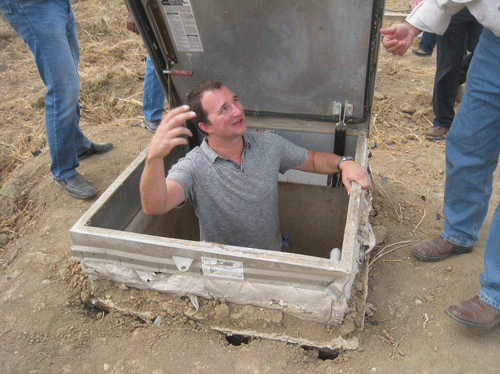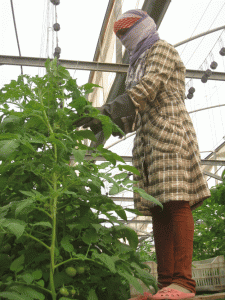Article by Laina Schneider
A local member of an all-woman agricultural crew tends to commercially grown tomoto plants in the Jordan River Valley.
What does it take to produce “more crop per drop”? An InnovATE team had this question on their minds this winter as they assessed the agriculture education and training system in Jordan. They hope to help the USAID mission design programs to improve water management, a critical component of the country’s agricultural system.
In a country where the average annual rainfall is less than 10 inches per year, water is a precious resource, and finding crops and agricultural practices best suited to conservation is imperative. Equally important is the creation of education and training programs to teach farmers about these water-saving agriculture practices.
At the request of the Jordanian Office of Water Resources and Environment, InnovATE conducted a scoping assessment to explore the potential expansion of agricultural education and training capacity, which would ultimately allow Jordanian farmers to improve water-use efficiency and conserve resources.
InnovATE team members from Virginia Tech and the University of Florida, along with faculty from the University of California, Davis, spent nearly three weeks conducting the scoping mission to create a baseline assessment of agricultural universities, private sector stakeholders, and vocational training programs. The team held focus groups and gathered data on programs, curricula and infrastructure to identify where capacity can be improved and expanded. Overall, the team felt the trip was a success. “Each person on the team was selected because of their skill set, so it was extremely useful to draw on each other’s experiences,” said Sandra Russo of the University of Florida.
The results of the scoping assessment revealed an interesting dichotomy. The Jordanian labor market has a high demand for agricultural professionals, but universities lack qualified graduates. Outdated curricula, emphasis on theory over practice, and the poor reputation of vocational education are all issues preventing students from learning the skills required to succeed in an agricultural field. Additionally, high numbers of female students pursue degrees in agriculture, but very few are actually employed in the agriculture sector after graduation.
These challenges informed the InnovATE team’s recommendations to improve workforce capacity with regard to water-saving agriculture training. They are also working with local personnel to update curricula at universities to create experiential opportunities for graduates, especially women, through internships and extension activities. ”We expect the team will aid in developing a multi-level certificate program in water-saving agricultural practices that would offer practical experience and training for vocational students, farmers and university students. The program would allow trainees to become certified in these techniques and therefore be more valued as employees to the public and private sector,” said Russo.
 These recommendations are not to be addressed by the Jordanian Office of Water Resources and Environment alone. The efforts in workforce development and agricultural education and training improvement will benefit from collaboration with many partners, including USAID. Looking forward, InnovATE hopes to develop an associate award with the USAID mission to ensure continued support. Associate awards are supplemental funds allotted to programs with the potential to continue having positive impact by expanding on a core project.
These recommendations are not to be addressed by the Jordanian Office of Water Resources and Environment alone. The efforts in workforce development and agricultural education and training improvement will benefit from collaboration with many partners, including USAID. Looking forward, InnovATE hopes to develop an associate award with the USAID mission to ensure continued support. Associate awards are supplemental funds allotted to programs with the potential to continue having positive impact by expanding on a core project.
The team emphasized that positive institutional change and the pursuit of growing “more crop per drop” both hinge on building stakeholder capacity. This is especially important in a place like Jordan, where rainfall is the exception, not the rule. By expanding capacity for water-saving agricultural education and training, Jordan can set an example for the increasing number of countries experiencing water shortages in the face of a shifting climate.


